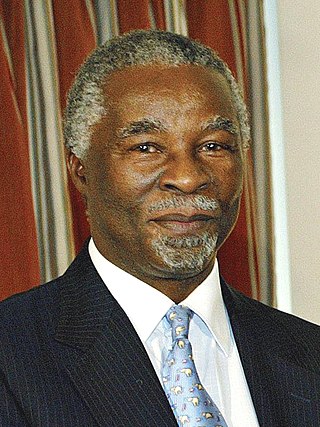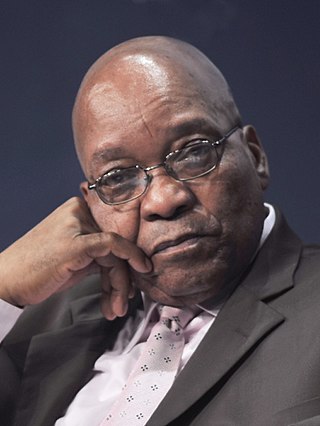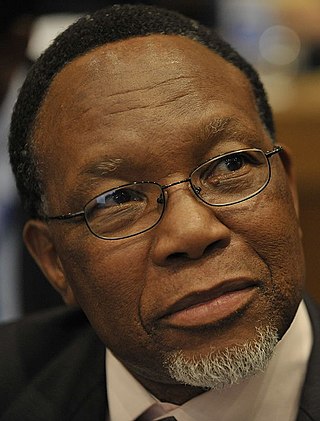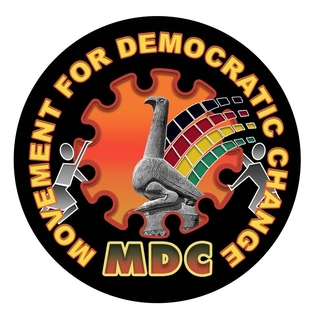
Thabo Mvuyelwa Mbeki is a South African politician who served as the second democratic president of South Africa from 14 June 1999 to 24 September 2008, when he resigned at the request of his party, the African National Congress (ANC). Before that, he was deputy president under Nelson Mandela from 1994 to 1999.

The president of South Africa is the head of state and head of government of the Republic of South Africa. The president directs the executive branch of the government and is the commander-in-chief of the South African National Defence Force. Between 1961 and 1994, the office of head of state was the state presidency.

General elections were held in South Africa on 2 June 1999. The result was a landslide victory for the governing African National Congress (ANC), which gained fourteen seats. Incumbent president Nelson Mandela declined to seek re-election as president on grounds of his age. This election was notable for the sharp decline of the New National Party, previously the National Party (NP), which without former State President F. W. de Klerk lost more than half of their former support base. The liberal Democratic Party became the largest opposition party, after being the fifth largest party in the previous elections in 1994. The number of parties represented in the National Assembly increased to thirteen, with the United Democratic Movement, jointly headed by former National Party member Roelf Meyer, and former ANC member Bantu Holomisa, being the most successful of the newcomers with fourteen seats.

General elections were held in South Africa on Wednesday, 14 April 2004. The African National Congress (ANC) of President Thabo Mbeki, which came to power after the end of the apartheid system in 1994, was re-elected with an increased majority.

Jacob Gedleyihlekisa Zuma is a South African politician who served as the fourth president of South Africa from 2009 to 2018. He is also referred to by his initials JZ and clan names Nxamalala and Msholozi. Zuma was a former anti-apartheid activist, member of uMkhonto we Sizwe, and president of the African National Congress (ANC) from 2007 to 2017.

Baleka Mbete is a South African politician who was the Deputy President of South Africa from September 2008 to May 2009. She was also the Speaker of the National Assembly for two non-consecutive terms from 2004 to 2008 and from 2014 to 2019. A member of the African National Congress (ANC), she was first elected to the National Assembly in 1994 and stepped down from her seat in 2019.

Grace Naledi Mandisa Pandor is a South African politician, educator and academic serving as the Minister of International Relations and Cooperation since 2019. She has served as a Member of Parliament (MP) for the African National Congress (ANC) since 1994.

Angela Thokozile Didiza is a South African politician who is currently serving as Minister of Agriculture, Land Reform and Rural Development since May 2019. A member of the African National Congress (ANC), she was the Minister of Agriculture and Land Affairs from June 1999 to May 2006 and Minister of Public Works from May 2006 to September 2008.
Brigitte Sylvia Mabandla is a South African politician, lawyer and former anti-apartheid activist who served in the cabinet of South Africa from 2003 to 2009, including as the Minister of Justice and Constitutional Development from 2004 to 2008. She became the South African Ambassador to Sweden in January 2020. A veteran of the African National Congress (ANC), she was an elected member of party's National Executive Committee between 1997 and 2012.
William Mothipa Madisha is a South African trade unionist and politician. Madisha is the former President of both the Congress of South African Trade Unions and the South African Democratic Teachers Union . Madisha grew up in Atteridgeville, Pretoria, South Africa, where he was a member of the United Democratic Front. He studied teaching at Transvaal College of Education.

Kgalema Petrus Motlanthe is a South African politician who served as the third president of South Africa from 25 September 2008 to 9 May 2009, following the resignation of Thabo Mbeki. Thereafter, he was deputy president under Jacob Zuma from 9 May 2009 to 26 May 2014.

Geraldine Joslyn Fraser-Moleketi is a South African politician who was the Minister of Public Service and Administration from June 1999 to September 2008. Before that, from July 1996 to June 1999, she was Minister of Welfare and Population Development. She represented the African National Congress (ANC) in the National Assembly from 1994 to 2008 and is a former deputy chairperson of the South African Communist Party (SACP).
South Africa since 1994 transitioned from the system of apartheid to one of majority rule. The election of 1994 resulted in a change in government with the African National Congress (ANC) coming to power. The ANC retained power after subsequent elections in 1999, 2004, 2009, 2014, and 2019. Children born during this period are known as the born-free generation, and those aged eighteen or older, were able to vote for the first time in 2014.

General elections were held in South Africa on 22 April 2009 to elect members of the National Assembly and provincial legislatures. These were the fourth general elections held since the end of the apartheid era.

The Movement for Democratic Change – Tsvangirai (MDC–T) is a centre-left political party and was the main opposition party in the House of Assembly of Zimbabwe ahead of the 2018 elections. After the split of the original Movement for Democratic Change in 2005, the MDC–T remained the major opposition faction, while a smaller faction, the Movement for Democratic Change – Ncube, or MDC–N, was led by Welshman Ncube.

An indirect presidential election was held in South Africa on 25 September 2008 following the resignation of the President Thabo Mbeki. The ruling party, the African National Congress (ANC), with a two-thirds majority in the National Assembly of South Africa, elected Kgalema Motlanthe as president. The ANC indicated that Motlanthe would be a "caretaker" president until the 2009 election, after which ANC president Jacob Zuma would take office.

The Congress of the People (COPE) is a South African political party formed in 2008 by former members of the African National Congress (ANC). The party was founded by former ANC members Mosiuoa Lekota, Mbhazima Shilowa and Mluleki George to contest the 2009 general election. The party was announced following a national convention held in Sandton on 1 November 2008, and was founded at a congress held in Bloemfontein on 16 December 2008. The name echoes the 1955 Congress of the People at which the Freedom Charter was adopted by the ANC and other parties, a name strongly contested by the ANC in a legal move dismissed by the Pretoria High Court.
Mathole Serofo Motshekga is a South African lawyer and politician who was elected to his third consecutive term as a Member of Parliament in the 2019 general election. He formerly represented his political party, the African National Congress (ANC), as the second Premier of Gauteng.
Penuell Mpapa Maduna is a South African politician and businessman. An anti-apartheid activist in his youth, Maduna was appointed to President Nelson Mandela's government in 1994. Thereafter he served as Minister of Mineral and Energy Affairs and, between 1999 and 2004, as Minister of Justice and Constitutional Development. Holding a doctorate of law from Unisa, he was also a long-time legal adviser to his party, the African National Congress, which he represented during the negotiations to end apartheid.
The Provincial Executive Committees (PECs) of the African National Congress (ANC) are the chief executive organs of the party's nine provincial branches. Comprising the so-called “Top Five” provincial officials and up to 30 additional elected members, each is structured similarly to the party's National Executive Committee (NEC) and is elected every four years at party provincial conferences.













